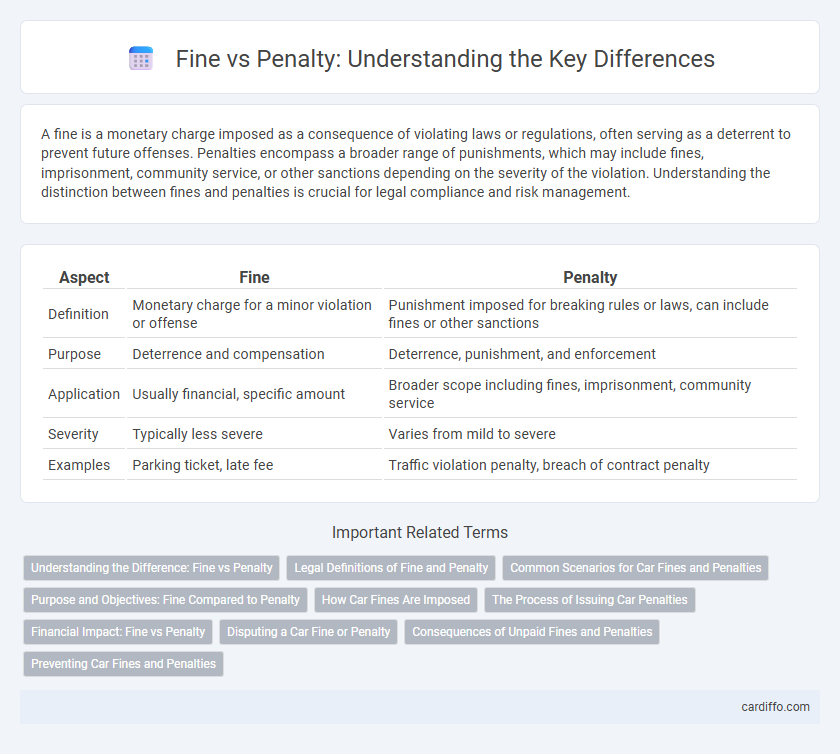A fine is a monetary charge imposed as a consequence of violating laws or regulations, often serving as a deterrent to prevent future offenses. Penalties encompass a broader range of punishments, which may include fines, imprisonment, community service, or other sanctions depending on the severity of the violation. Understanding the distinction between fines and penalties is crucial for legal compliance and risk management.
Table of Comparison
| Aspect | Fine | Penalty |
|---|---|---|
| Definition | Monetary charge for a minor violation or offense | Punishment imposed for breaking rules or laws, can include fines or other sanctions |
| Purpose | Deterrence and compensation | Deterrence, punishment, and enforcement |
| Application | Usually financial, specific amount | Broader scope including fines, imprisonment, community service |
| Severity | Typically less severe | Varies from mild to severe |
| Examples | Parking ticket, late fee | Traffic violation penalty, breach of contract penalty |
Understanding the Difference: Fine vs Penalty
A fine is a monetary charge imposed as a punishment for minor legal offenses, often regulatory or administrative violations. A penalty can encompass fines but also includes additional sanctions such as restrictions, points on licenses, or imprisonment for more severe breaches. Understanding the difference helps clarify that fines are specific financial punishments, while penalties represent a broader category of consequences imposed for legal infractions.
Legal Definitions of Fine and Penalty
A fine is a monetary charge imposed by a court or authority as punishment for a legal offense, typically fixed and predetermined by law. A penalty, in legal terms, encompasses a broader range of consequences, including fines, imprisonment, or other sanctions designed to enforce compliance or punish violations. The distinction lies in fines being specific financial sanctions, whereas penalties refer to any punitive measures under legal statutes.
Common Scenarios for Car Fines and Penalties
Common scenarios for car fines and penalties include speeding, illegal parking, and running red lights. Speeding fines vary based on how much the speed limit is exceeded, often increasing with severity. Penalties for illegal parking can include towing or immobilization, while red light violations typically result in hefty fines and potential points on the driver's license.
Purpose and Objectives: Fine Compared to Penalty
Fines serve as monetary sanctions imposed to deter individuals and organizations from violating laws or regulations by creating a financial disincentive. The primary purpose of fines is to enforce compliance and promote lawful behavior without necessarily punishing the offender beyond the financial loss. In contrast, penalties often encompass broader consequences, including fines, but aim to impose more severe or corrective measures to address violations.
How Car Fines Are Imposed
Car fines are imposed through a regulatory framework that involves traffic law enforcement agencies issuing citations based on violations such as speeding, illegal parking, or running red lights. These fines are calculated according to predetermined schedules that consider the severity of the offense and its potential risk to public safety. Automated systems like traffic cameras and officer-issued tickets play key roles in detecting violations and initiating the fine imposition process.
The Process of Issuing Car Penalties
Car penalty issuance begins with traffic law enforcement officers or automated cameras capturing violations through photographic or video evidence. The recorded data is forwarded to relevant authorities who verify the infraction, calculate the associated penalty fees, and prepare official notices. These penalty notices are then dispatched to vehicle owners, detailing the violation specifics, payment instructions, and deadlines for compliance.
Financial Impact: Fine vs Penalty
Fines impose a fixed financial charge for regulatory non-compliance, often determined by the severity of the violation, directly affecting a company's operating costs. Penalties encompass a broader range of financial burdens, including interest, fees, and additional sanctions, which can escalate the total monetary impact beyond the initial fine. Both fines and penalties significantly influence a business's financial health, but penalties typically result in higher expenses due to accumulated costs and legal implications.
Disputing a Car Fine or Penalty
Disputing a car fine or penalty requires gathering evidence such as photographs, witness statements, or proof of payment to support your case. Submit a formal appeal to the issuing authority within the specified timeframe, clearly outlining reasons for contesting the fine or penalty. Understanding local traffic regulations and maintaining thorough records can significantly increase the chances of successfully overturning an unjust car fine or penalty.
Consequences of Unpaid Fines and Penalties
Unpaid fines can lead to increased financial burdens due to accruing interest and additional fees, escalating the original amount owed. Penalties for non-payment often include legal actions such as wage garnishment, property liens, or even license suspension, severely impacting personal and professional life. Ignoring these obligations may result in a damaged credit score and long-term difficulties in obtaining loans or other financial services.
Preventing Car Fines and Penalties
Preventing car fines and penalties involves understanding traffic laws and consistently following speed limits, parking regulations, and signal rules. Using technology such as GPS alerts and mobile apps for traffic updates can help drivers avoid violations. Regularly reviewing vehicle documentation and ensuring compliance with road safety measures reduce the risk of fines and penalties.
Fine vs Penalty Infographic

 cardiffo.com
cardiffo.com